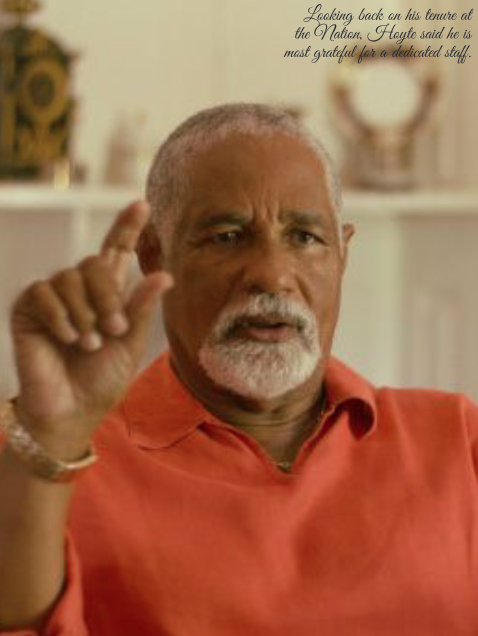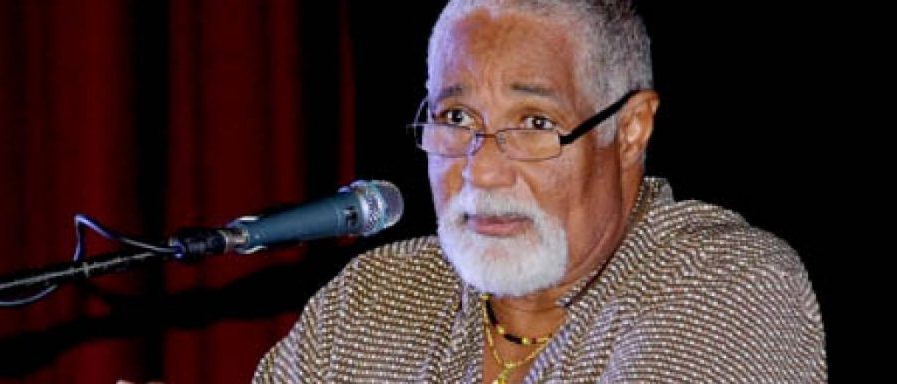In 2016, Barbados TODAY interviewed veteran journalist Harold Hoyte as part of its Bajan Gem series which featured outstanding Barbadians that made significant contributions to the island as it marked its 50th anniversary of Independence.
Here is the full feature.
By Marie Claire Williams
For 30 years, Harold Hoyte was at the helm of the Nation Newspaper as Editor-in-Chief. But since retiring ten years ago, his attention has shifted to ticking items off his bucket list.
“If I knew it was going to be so good, I would have retired before I started to work,” he says jokingly. “The freedom to do what you want to do, to say ‘no’ when you want to say ‘no’, it’s a great feeling . . .”
Hoyte’s bucket list includes “simple stuff” that the demands of running a daily newspaper did not allow him the luxury of enjoying, such as reading and learning to swim.
“I could paddle in the water and so on, but I really could not swim with any strength or assurance, and I committed to do that and I have done it. I went to the Aquatic Centre, registered, got a coach and for three years I learnt to swim. I can more than handle myself in the water now,” he told Barbados TODAY.
He has also had the chance to pursue another one of his passions – baking.
“I love baking. All my life, I baked pastry, cakes, bread, that kind of stuff, but I did not have the technical know-how. I registered in a course and I learnt to bake. So, I can do anything from jam puffs, turnovers, whatever now.”
But before Hoyte could enjoy life’s simple pleasures, most of his time was spent building the island’s main print publication, the Daily Nation, which he co-founded in 1973.
Prior to that, he lived in Canada for several years, where he was a newspaper editor. He remembered that both he and his wife had difficulty finding jobs and decent housing – experiences that left him disillusioned but determined to set about highlighting the lives of blacks back home.
“It started really out of some sense of disappointment with the status quo at that time. I had just come back from living in Canada. I had the concept of giving Barbados a ‘black’ newspaper because my experience in Canada made me racially conscious. And I started to look at the situation in Barbados and there were certain things that needed to be redressed so I came back with that notion, began to talk to people of like mind. And as we discussed it, I recognized that my concept of a black newspaper was not going to resonate in this country; but what could resonate would be a black-owned newspaper.”
The paper was established in 1973 as a weekly publication, with Hoyte as chairman and Carl Moore as the first editor.
“I did not feel at that time that my views would have fitted into Barbadian society . . . So even though I recognized that a black newspaper was not what would succeed in Barbados, I still held a lot of the views that I had about empowering black people in Barbados,” he recalled.
“I could not have been editor; I really couldn’t have been. Carl had lived here all his life, I had been away for a while. I was chairman of the board for the first year-and-a-half, two years. And then when he resigned . . . I then decided that I would have to bite the bullet and I would have to put on the shoes of the editor and do the job,” Hoyte added.
By then, he had “softened a whole lot” and was ready to lead the paper.
“The reality of Barbados had hit me. You know, a friend of mine . . . said to me ‘Harold, 250,000 Bajans cannot be wrong’. And I began to internalize that. What he was saying is that there is a racial accommodation in Barbados that they have been living with all their lives. They can’t be wrong. You need to adjust to those 250,000 people. And that’s what I did.”
Looking back on his tenure at the Nation, Hoyte said he is most grateful for a dedicated staff.
“We built up an organization that looked after workers . . . Because of my trade union background, I had an interest in protecting the workers as well. So, I went into the newspaper business with the understanding that workers would get the full benefit of representation, whether or not they were in the union. So, I think out of that came a great sense of family and commitment,” he said.
One of his fondest memories is the coverage of the general elections of 1976.
“Because we were printing in Trinidad at the time, we didn’t have our own press. So, we used to go to Trinidad every Tuesday with the paper, have it printed on Thursday and sell it on Fridays.
“That election . . . we chartered an aircraft, left here about 10 o’clock the night, writing stories about the election, developing film – that was the era of film. The photographer, Gordon Brooks, he was in the washroom of the aircraft developing the film of pictures from the election; the proof-reader . . . was in the belly of the aircraft proofreading the text. And then when we got to Trinidad, Al Gilkes and I got involved in calling back to Barbados to [the now late] Charles Harding who was our anchor man in Barbados. He provided us with the information as the results came in, and we compiled a paper, got it printed and brought it back to Barbados the morning after the elections, and it came out before the Advocate that was printed in Barbados. So, it was a phenomenal experience.”

Although the Advocate was his competitor in 1976, it was at that media house that Hoyte had begun his professional career, after his teachers at Harrison College encouraged him to pursue journalism.
“So, when I left school, very presumptuous, very bold, I went down to the Advocate and I . . . gave him [the editor] a copy of the paper that I was producing at school and I told him ‘I want to make the Advocate as good as my newspaper’. You would have to see the expression on his face. He turned red! But I think he liked my courage and he hired me on the spot,” Hoyte recalled.
He started off there as a copy editor, but wasted no time in learning fully how the paper worked.
“Because I had an interest in becoming the ultimate journalist – the editor – I made sure that I took opportunities to do things that subeditors didn’t do. So . . . I would arrange to be off when the House of Assembly was meeting so I could go to the House of Assembly and cover the House, or I would go to the law courts and cover the courts so I got an appreciation of every aspect [of the business].”
For any young person considering a career in journalism, Hoyte’s advice is to be prepared to make serious sacrifices and have a social conscience.
“I do not like to see people in journalism who do not care about people who are marginalized, people who are suffering, people who are sick. So, if you don’t bring a sense of social conscience to the job, then you’re not going to carry it out in the way that you should, because you will not be able to appreciate the role that the media has to play,” he said. (MCW)




